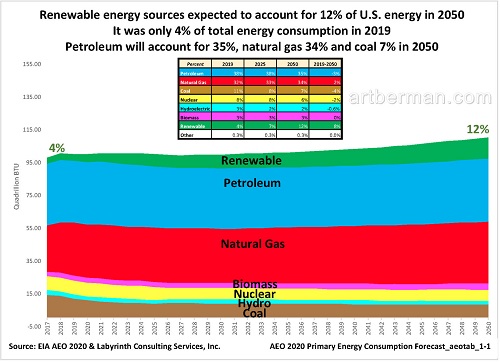Renewable energy will be increasingly important going forward but so far, the renewable rocket has failed to get off the launch pad.
Advocates of different energy sources usually base their promotional efforts on price. These days, we hear how the price of renewable energy is falling and may soon be cheaper than all competing forms of energy.
“Solar PV and onshore wind are now the cheapest sources of new-build generation for at least two-thirds of the global population.”
–-Bloomberg NEF
In 1954 we heard that nuclear power would soon be too cheap to meter. That did not work out well.
If renewable energy is so cheap, why does solar and wind account for a tiny fraction of energy use?
Renewable energy–solar and wind–accounts for only 4% of U.S. energy use today and is only expected to reach 12% by 2050 according to latest EIA forecasts (Figure 1). Like all forecasts, it is probably wrong but reflects current thinking based on price, availability and adoption rates by the public. Double renewables by 2050 and it still is hardly the success story its promoters claim.

Figure 1. Renewable energy sources expected to account for 12% of U.S. energy use in 2050. Source: EIA AEO 2020 and Labyrinth Consulting Services, Inc.
|
Price ≠ Cost ≠ Value
Part of the disconnect is that most analysts incorrectly use price, cost and value interchangeably.
The price is what I pay as a consumer. The cost is what the provider pays to produce the product. The value is what the product creates for the consumer and society.
In the case of oil, the price is now about $24/barrel. The cost is about $65.
A barrel of oil contains ~4.5 years of human labor in megawatt hours, joules or whatever unit you prefer. The value is about $117,000 using a median U.S. income of $26,000/year. Oil has the greatest energy density of any of the available sources today.
And that is the problem for renewable energy. It has a much lower energy density so it can never provide the same value regardless of its price or its cost. The only way to meet current energy needs with renewables is to greatly expand the number of units—solar panels or wind turbines—that provide the energy. To provide more energy output requires more energy input–pretty basic physics. That in turn creates more emissions and confounds the purpose of cleaner energy.
Pedro Prieto is among the world’s top experts on renewable energy and is author of Spain’s Photovoltaic Revolution. In a recent email discussion he wrote the following:
“If renewables have already reached grid parity and are now are so dirt cheap, why haven’t they taken over massively, not only in electric networks, but in all other functions of the world economy?
“It is time for unconditional pro-renewable promoters to make an act of contrition and start admitting that perhaps they grossly missed the elephant in the room (massive storage, intermittency, other related and sine qua non societal energy costs?) in their EROI and LCOE calculations.
“The renewables rocket has spent already many years in the launch pad, roaring and expelling lots of fumes through its nozzles, but it has not been able to take off, unable to lift. Perhaps it is because it had hanging from it that big elephant that many experts missed or ignored for such a long time.”
–Pedro Prieto
The popular belief that the world can run 100% on renewable energy seems far in the future based on Figure 1. No matter how much we want to change from fossil to renewable energy, it is not feasible to go from 4% to even 50% in less than several decades, much less 100%.
A 100% Renewable Future Means a Poorer World
A 100% renewable economy is fine only if we are willing to accept a lower living standard and much smaller population than we have today.
Humans have never gone from a higher to a lower density energy source. A renewable energy world would have a smaller and less productive economy because of the lower energy density of its primary source.
I am an advocate for solar and wind, and I take climate change very seriously. It is, however, critical that people know the truth: the world will be much poorer when fossil energy is abandoned.
Many believe that the Coronavirus crisis will hasten the transition to renewable energy. I believe the opposite will occur. As I wrote last month, “A world in economic depression will default to the cheapest and most productive fuels. Oil will be cheap and abundant for a long time. There will be little money or appetite for the massive equipment changes that renewable sources require. Climate change will not be high in the consciousness of people struggling to survive.”
Humans will self-organize around energy as we have always done. It is impossible for humans to choose an energy source that violates the genetic imperative to expand as a species. When that happens, it will be imposed by circumstances that make survival a greater imperative than growth.
Coronavirus is a substantial step in that direction but is only a prelude. The economy is unlikely to fully recover from the economic damage done already. If premature opening of the economy results in another period of quarantine, the damage will be greater.
The effects of this virus will be recognized in time as a fundamental and painful shift in the course of human history. The result of the transition to a 100% renewable energy future will, by comparison, be traumatic.
|
ABOUT THE AUTHOR
Art Berman is a petroleum geologist who is fascinated by oil and gas markets. He also has a degree in Middle Eastern history, which gives him a completely different perspective than other analysts. He loves unraveling the complex factors that drive markets and prices. Looking at everything but comparative inventories is the cornerstone of his approach.
|